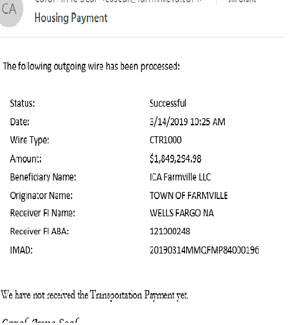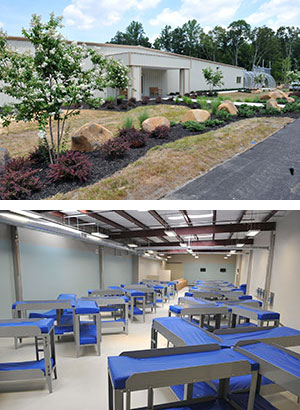Designed to ensure profitability for shareholders, private detention largely operates in the shadows, leaving communities in the dark about the operations of new and existing facilities. The U.S. immigration private detention industry is dominated by two notorious companies, GEO Group and CoreCivic (formerly CCA), but a third company, Immigration Centers of America (ICA) is aggressively pursuing detention center contracts across the country.
ICA currently operates only one immigration detention center, in Farmville, Virginia, but it already has a track record of avoiding accountability for abusive conditions. Furthermore, newly released documents shed light on the money transfer scheme between Immigration and Customs Enforcement (ICE), ICA, and the Town of Farmville which illuminate how the company profits from detaining immigrants as it tries to expand to new regions. The documents were obtained in response to public records requests as part of NIJC’s Transparency Project, which has published the most comprehensive collection of immigration detention contracts and inspections documents to date. They informed a recent investigation by CQ Roll Call into immigration detention profit schemes, in advance of a House Judiciary Committee hearing focused on ICE’s rapid expansion of the detention system.
The Kickback Scheme

The town of Farmville signed an Inter-Governmental Service Agreement (IGSA) with ICE in 2008 and opened the facility amidst protests. Although ICA has no direct contract with ICE, the company is the exclusive operator of the Farmville jail. The IGSA, and many others like it, operate through what is essentially a kickback scheme, wherein the town gets a small cut of the private prison company’s profits for hosting the facility. This “middleman contracting” arrangement has been found to be improper under federal procurement law, and stifles accountability for violations that occur within the facility walls.
The new documents illuminate how the private detention contracting scheme works. Initially, ICE established a per diem of $79.89 per individual detained in Farmville. Over time, ICA Farmville’s per diem rate jumped to a base rate of $120.75 per day per person jailed, with incremental increases for every additional person held over 500. The documents show that ICA Farmville billed ICE $2,069,258 during the month of April 2019, for example, and the town took a cut of $20,489.
The records also show how ICE negotiates directly with ICA, cutting out the Town of Farmville until it’s time for the financial transaction. In one November 2018 email exchange, ICA CEO Russell Harper and DHS procurement officials discussed “emergency bed rates” for a potential influx of people at the Farmville jail. The town treasurer was looped in only after an agreement was made, to make the money transfer happen. A June 2019 modification to the Farmville ICA contract shows the negotiated emergency bed rate came to $54.69 for every additional person held at the jail over 737, and that ICE planned to spend an additional $12 million for beds and operational costs at the facility. Invoice records show the population reached nearly 800 in May 2019.
The internal exchanges include emails from ICA’s CFO to the Farmville town treasurer, light-heartedly writing: “I’m feeling lucky today so I wanted to check on our funds. Has anything shown up?” The town treasurer wrote back, “Nothing has shown up yet. I will keep checking during the day as always.” At that time, ICE employees had been on furlough because of the government shutdown, and ICA was trying to get paid. Eventually the payment from Farmville to ICA went through, $1.8 million wired on March 14, 2019.
The transactional nature of the email correspondence is striking when considering that officials are discussing pricing for the incarceration of human beings. The records lay bare the dehumanizing nature of the profit-driven detention system, where people are treated as commodities, to be exchanged for profit.
“I’m feeling lucky today so I wanted to check on our funds. Has anything shown up?”
- ICA Chief Financial Officer to the Farmville Town Treasurer
Waiving Accountability
Private companies also circumvent federal contracting requirements by receiving waivers that exempt them from complying with federal performance standards. In January 2019, the DHS Inspector General found that ICE’s multilayered system to manage and oversee detention contracts did “not adequately hold detention facilities contractors accountable for not meeting performance standards.” Further, the Inspector General found, ICE did not have formal policies in place to govern waivers, and gave free reign to officials to rubber stamp requests for waivers.
ICA Farmville received a waiver in 2013 for inspections relating to the requirement that each detention center have one toilet for every 12 men and or one for every eight women. The reason? The plumbing work necessary to meet the relevant standard would cost an additional $400,000, and take 30 days to complete. That waiver is still in place, meaning ICA Farmville has not had to comply with the ratio rules for six years. ICE’s latest figures show 181 waivers in place for detention centers across the country, ranging from inspections relating to holding areas at entrances of medical facilities, medical grievance systems, dental care, and other issues foundational to the health and safety of those detained.
History of Abuse

Photo credit: ICE
In June 2019, after ICA Farmville suspended lawyer visits in response to a mumps outbreak, detained immigrants organized a “meal strike” in protest of the restricted freedoms following the quarantine. Guards cracked down on the protesters, using pepper spray and putting some into solitary confinement. The protesters are suing ICE Field Office Director Russell Hott and ICA Farmville Warden Jeffrey Crawford over the incident.
The mumps outbreak was only the most recent evidence of conditions problems at ICA Farmville. DHS’s Office for Civil Rights and Civil Liberties opened an investigation into the prison in 2015 in response to complaints regarding medical care, use of force and restraints, lack of religious accommodation, environmental health and safety, and other abusive conditions of detention. CRCL stopped the investigation when ICE adopted its recommendations, but continued to receive complaints of abuse after concluding the onsite investigation, including use of force incidents.
In October 2011, Anibal Ramirez-Ramirez, a Salvadoran national, died five days after being processed in the facility. ICE’s own contractor found that the intake screening at ICA Farmville was inadequate, and when the nurses checked on Mr. Ramirez-Ramirez, they failed to take his vital signs. The inspection that preceded Mr. Ramirez-Ramirez’s death indicates that ICE was aware of problems. ICA Farmville failed its April 2011 inspection, which found seven deficiencies, including failing a mandatory component regarding staff responsiveness to medical emergencies.
ICA Expansion
In the past year, ICA has pursued new contracts to open ICE detention centers in the Midwest and Washington, D.C. area. The company submitted a proposal early in 2019 for a new 1,200-bed ICE facility in the town of Dwight, Illinois, about 75 miles south of Chicago. The proposal drew widespread criticism from local opponents who organized under the banner of No ICE Dwight. Opposition to the prison fueled the passage of state-level legislation banning Illinois municipalities and law enforcement agencies from entering into contracts, receiving payments, providing payments or giving any financial incentives to a detention facility operated by a private company. The law created a major hurdle to ICA advancing the site in Dwight.
Even more recently, ICA responded to an ICE request for information on a new detention facility in Maryland. Community groups are organizing to protest any new facilities in Maryland, which already has three ICE detention centers in Frederick, Howard and Worcester counties.
Defund Hate
Contractors are making billions jailing an unprecedented number of people — thousands more than Congress has authorized — and ICE is blatantly undermining Congress to make it possible. There is no policy justification for the current detention levels, and now is the time for Congress to reassert its power to hold the executive branch accountable. Congress can start by proactively ensuring that enforcement agencies do not overspend under any initial short-term spending bill, while demanding that a negotiated 2020 spending bill cut ICE’s budget and finally put an end to DHS’s ability to transfer and reprogram funds into its detention and enforcement accounts. Congress must also demand transparency measures to ensure that transfer and reprogramming notifications and other critical budget documents with public significance be promptly made accessible to all members of Congress and the public.
For more information, contact Jesse Franzblau, NIJC senior policy analyst, by email.

